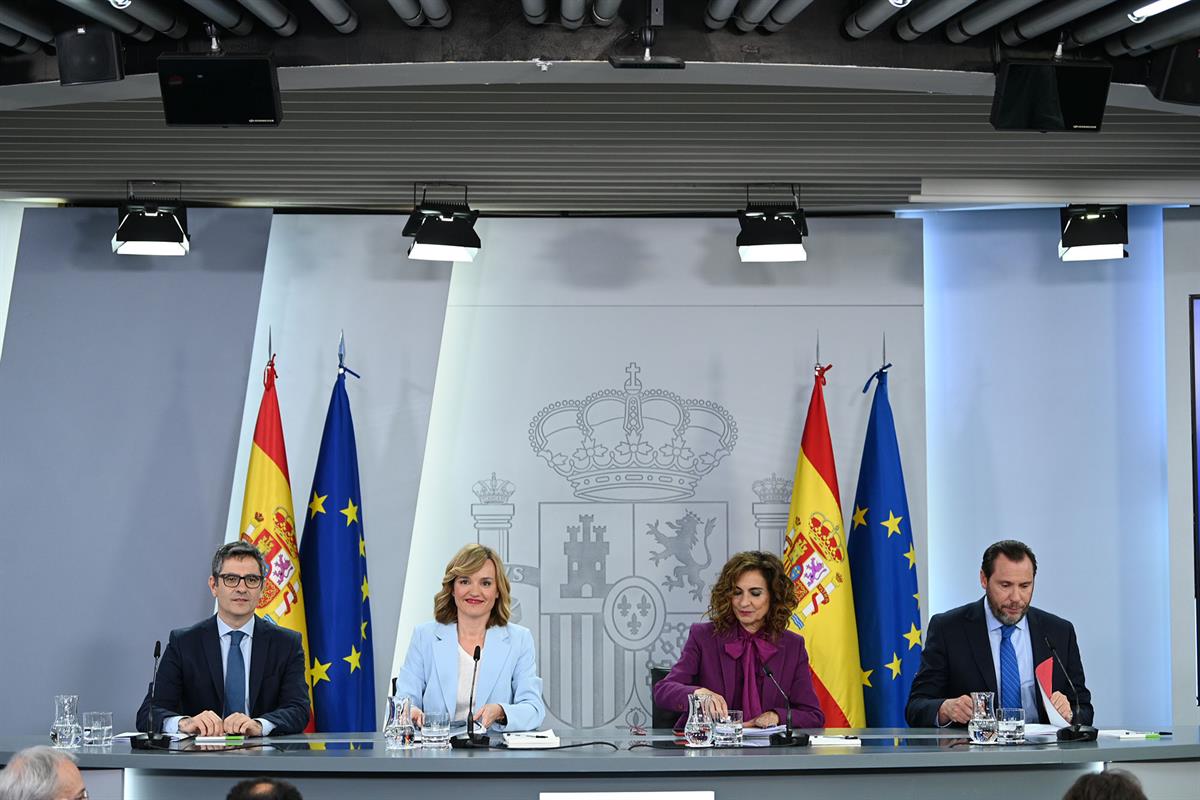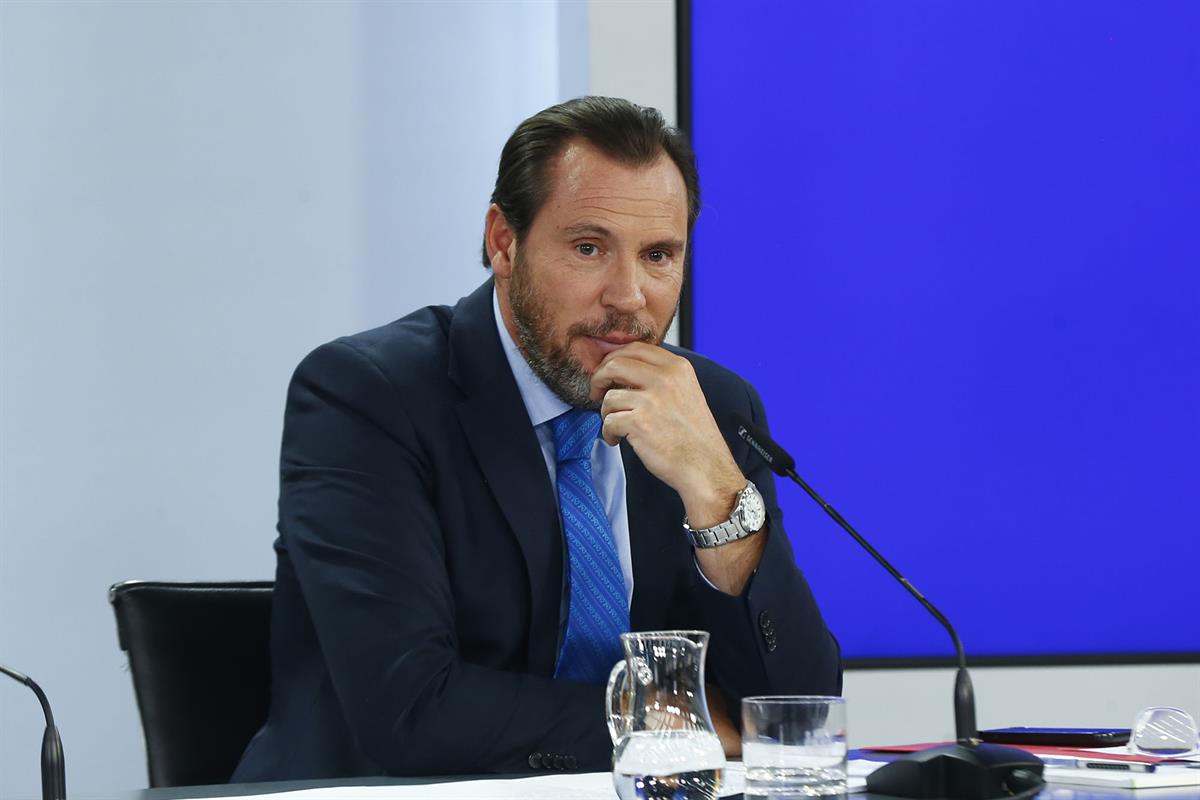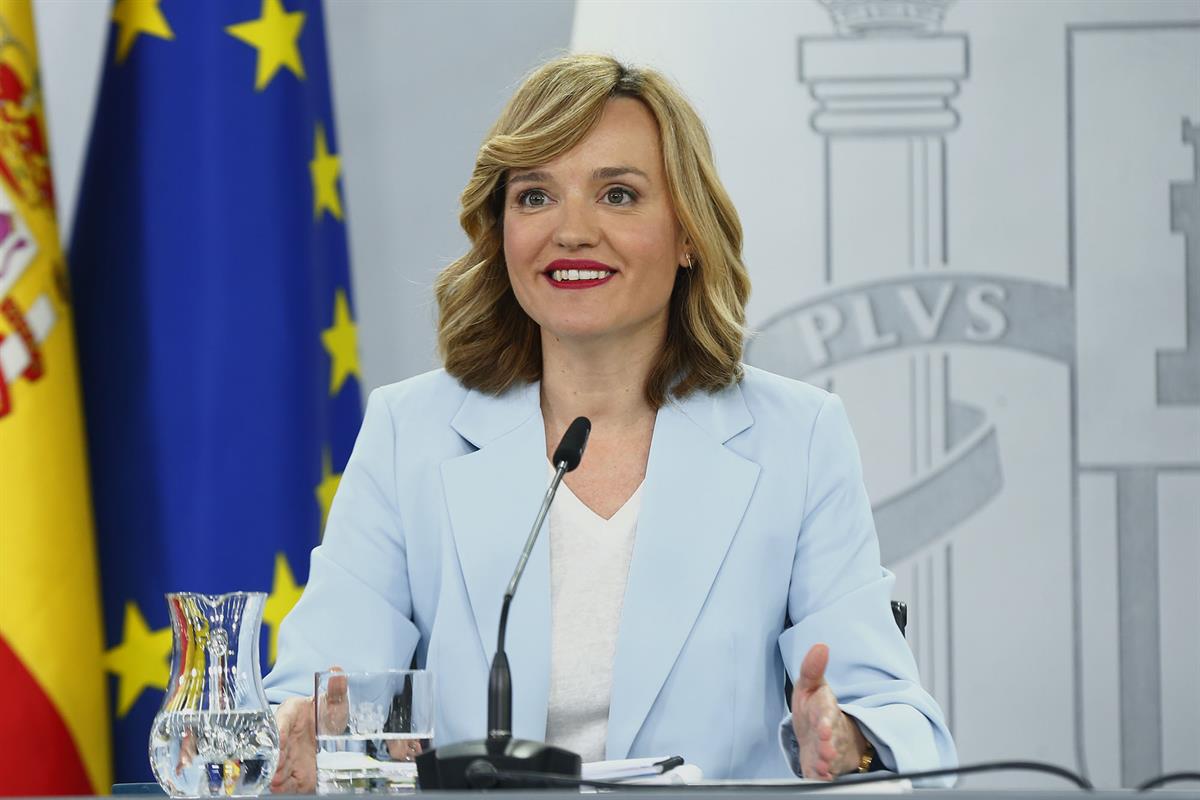Council of Ministers
The Government of Spain makes progress on the protection of minors in the digital environment
Council of Ministers - 2024.6.4
Moncloa Palace, Madrid
 The Ministers Félix Bolaños, Pilar Alegría, Mª Jesús Montero and Óscar Puente, during the press conference after the Council of Ministers (Pool Moncloa/Borja Puig de la Bellacasa)
The Ministers Félix Bolaños, Pilar Alegría, Mª Jesús Montero and Óscar Puente, during the press conference after the Council of Ministers (Pool Moncloa/Borja Puig de la Bellacasa)
The Council of Ministers has addressed the draft organic law to guarantee the protection of the rights of minors in the digital environment, and the protection of their personal data and access to age-appropriate content. The text will be sent to the advisory bodies for their mandatory reports. The Government plans to submit it to Parliament after the summer.
The Executive also analysed today a diagnostic report on this issue presented by the Minister for Youth and Children, Sira Rego, which includes the contributions of the committee of experts that is collaborating in the drafting of the national strategy on the protection of children and adolescents in the digital environment, which will be approved in the autumn and reviewed every three years.
The Minister for the Presidency, Justice and Parliamentary Relations, Félix Bolaños, recalled that both regulations respond to the commitment made by the President of the Government, Pedro Sánchez, to promote a broad agreement at national level to protect minors in the digital environment.
Main lines of action
 The Minister for the Presidency, Justice and Parliamentary Relations, Félix Bolaños, during his speech at the press conference after the Council of Ministers | Pool Moncloa/José Manuel Álvarez
The Minister for the Presidency, Justice and Parliamentary Relations, Félix Bolaños, during his speech at the press conference after the Council of Ministers | Pool Moncloa/José Manuel Álvarez
Félix Bolaños has advanced that the future law contains measures for prevention and for the training in digital skills of minors, their families and the professionals who come into contact with them, such as teachers and healthcare professionals. It also includes amendments to the Penal Code to criminalise certain offences committed in the technological environment, and reinforces parental control and verification of the age of people accessing websites and social networks.
Secure digital environments
The minister detailed that public authorities will be obliged to carry out awareness-raising campaigns on the rights of minors in the digital environment and the risks associated with it. Meeting places will be promoted where children can develop healthy leisure and recreational activities, away from digital environments and social networks.
In the health field, the future law includes measures for the early detection, prevention and specialised care of minors with pathologies related to the inappropriate use of digital tools. In the area of education, education in digital citizenship, media literacy, privacy, data protection and intellectual property will be promoted.
Adapting the legal framework to new forms of crime
Bolaños pointed out that the law will amend the Penal Code to be able to punish inappropriate conduct taking place in the digital environment, including as criminal offences.
The future law criminalises deepfake pornography, i.e. the dissemination of images or audios that appear to be real, but have been generated by artificial intelligence or other technologies and simulate situations of sexual or vexatious content, without the authorisation of the affected party. It also criminalises online grooming of minors and the dissemination of pornographic material to minors.
The text also regulates online restraint so that convicted offenders cannot contact the victim by digital means.
Obligations for companies in the technology sector
The minister recalled that on 4 March the President of the Government of Spain met with the main technology companies operating in Spain and proposed that they collaborate in the application of measures to protect minors in the digital environment.
To this effect, the future law establishes that manufacturers must ensure that digital devices have parental control activated by default and informative labelling on their risks. They will also have to implement effective age verification systems.
Felix Bolaños added that video-sharing platforms should have a direct link to the complaint channel and parental control systems accessible to any user. The regulation prohibits minors from accessing random reward payment mechanisms in video games and platforms (loot boxes), and forces influencers to join the measures to protect minors. It also raises the minimum age at which consent to the processing of personal data can be given from 14 to 16.
The minister concluded by pointing out that Spain wants to lead the debate in the EU on this matter and advocates achieving homogeneous regulation in all countries.
Fairer business taxation
 The First Vice-President of the Government and Minister for Treasury, María Jesús Montero, during her speech at the press conference after the Council of Ministers | Pool Moncloa/José Manuel Álvarez
The First Vice-President of the Government and Minister for Treasury, María Jesús Montero, during her speech at the press conference after the Council of Ministers | Pool Moncloa/José Manuel Álvarez
The Council of Ministers has sent to Parliament the draft law to transpose the European directive guaranteeing an overall minimum tax rate of 15% for multinational groups and large national groups in the EU. The text complies with the agreement reached at the OECD - now ratified by more than 100 countries - to combat the shifting of profits of large multinational groups to lower tax locations.
"It is a matter of moving towards a fairer international tax order which, if possible, is harmonised, based on the idea that has always been defended by this Government: that those who earn more should contribute more to all of society", said First Vice-President of the Government and Minister for Treasury, María Jesús Montero. The vice-president stressed the importance of tax justice as a basis for the development of social justice and the welfare state, and the need for international cooperation to achieve progress in an increasingly globalised world.
Montero recalled that within the framework of the OECD, Spain led the preparatory work to adopt measures against the "aggressive tax planning" of large companies and has been an important player in achieving the greatest possible consensus. The Minister for Treasury also stressed that Spain had pioneered some of these tax policies, such as the 15% minimum corporate income tax rate for large companies set for 2022.
In the same vein, Montero cited the levies on large companies for certain digital services on financial transactions, and on energy companies and banks with record profits due to the increase in energy prices and interest rates. The revenue from these taxes has, in turn, enabled VAT to be reduced on energy and basic foodstuffs, which are important in the diets of vulnerable groups. "We collect on one side, and we stop collecting on the side that affects the vast majority of the population", said Montero, who described the Government's fiscal policy as "responsible" and based on international agreements and recommendations.
Overall minimum tax rate
The draft law establishes an overall minimum tax rate for multinational corporate groups and large domestic groups with a turnover of more than €750 million. The rule aims to prevent companies from shifting profits to territories with low or zero taxation, something that harms member states' revenues and leads to a spiral wherein countries are forced to reduce their corporate tax rates to attract investment, Montero explained.
The directive provides that states can apply a supplementary tax on multinationals and large national groups based in their territory that do not achieve a minimum taxation of 15% in their jurisdiction. Following the adoption of the draft law, Spain will implement this tax, which can take different but complementary forms.
The first vice-president detailed that, according to Tax Agency estimates, the regulation will affect 126 groups with Spanish parent companies and 707 multinational groups with foreign parent companies and Spanish subsidiaries. With regard to the revenue the Treasury expects to obtain with the transposition, María Jesús Montero explained that it will depend on how each EU country adapts the directive. The minister pointed out that it is foreseeable that "everyone will try to collect the 15% and that it will not fall into the hands of other countries".
Second edition of the Verano Joven programme
 The Minister for Transport and Sustainable Mobility, Óscar Puente, during the press conference after the Council of Ministers | Pool Moncloa/José Manuel Álvarez
The Minister for Transport and Sustainable Mobility, Óscar Puente, during the press conference after the Council of Ministers | Pool Moncloa/José Manuel Álvarez
The Council of Ministers has activated the second edition of the Verano Joven programme, an initiative designed to make it easier for young people aged between 18 and 30 to travel by public transport in Spain and the rest of Europe. Beneficiaries will enjoy discounts on the price of single and return tickets for journeys made between 1 July and 30 September 2024.
The Minister for Transport and Sustainable Mobility, Óscar Puente, has linked this new call for proposals to the success of last year's proposals: 1.13 million young people made 4 million trips in Spain, and 16,134 Interrail Passes were registered for travel throughout Europe. To this effect, the programme fulfilled the main objectives for which it was designed: to facilitate summer travel for young people, especially those with a lower economic status; to encourage the use of public transport - particularly rail - among this segment of the population; and to promote national tourist and cultural destinations, particularly those in rural Spain.
"Travelling is probably one of the most enriching contributions for a person undergoing training," the minister said. "In this regard, young people are one of this government's priority groups, and they are at the centre of many of the policies we have implemented", said Puente, who recalled that the programme is being processed through a Royal Decree-Law and that, therefore, "the measure born today in the Council of Ministers can be endorsed by all the parliamentary groups" that validate it.
Extension of beneficiaries
One of the main novelties of the second edition of Verano Joven is that there are now more potential beneficiaries. Last year it included only young people of Spanish nationality and European residents in Spain, whereas for 2024 it will be extended to all residents, regardless of their nationality.
To access the discounts, interested parties will have to register and identify themselves on a website that the Ministry of Transport and Sustainable Mobility is setting up. The minister specified that they expect it to be operational before 15 June. After verification of eligibility, these young people will be provided with a unique registration code for the whole period of the programme, with which they will be able to access the discount on their tickets, as was the case in the previous edition.
The planned investment in the initiative is €130 million, €75 million for rail journeys and €55 for bus journeys. This amount will enable a 90% discount to be applied to the price of tickets for regular state bus services and medium-distance and metric gauge rail services. The reduction will be 50% on Avant single tickets and 50% on tickets -with a maximum of €30 per ticket- for commercial long-distance or high-speed services on all rail corridors. There will also be a 50% discount on the 10-days-in-2-months Global Flexible Interrail when marketed through Renfe.
"We are sure that the figures for Youth Summer 2024 will exceed last year's, and that it will contribute to broadening the knowledge our young people have of their country, while at the same time boosting their autonomy and their personal relationships," said Puente.
New grants for Ecological Transition, Culture and Education
 The Minister for Education, Vocational Training and Sports and Government Spokesperson, Pilar Alegría, during the press conference after the Council of Ministers | Pool Moncloa/José Manuel Álvarez
The Minister for Education, Vocational Training and Sports and Government Spokesperson, Pilar Alegría, during the press conference after the Council of Ministers | Pool Moncloa/José Manuel Álvarez
The Minister for Education, Vocational Training and Sports and Government Spokesperson, Pilar Alegría, has reported that the Council of Ministers has authorised new subsidies announced by the Ministries of Ecological Transition, Culture and Education. In the first case, the Executive has given the go-ahead for an allocation of €19 million so that different local entities - municipalities and provincial councils - can finance innovative projects that address the challenge of depopulation.
In the second case, a new call for proposals has been approved for €62 million for the production of feature films. According to Alegría, at least 35% of this amount should go to projects directed by women, and at least 10% to animated films.
Last, the spokesperson of the Executive informed of the approval of a €103-million call for proposals to finance training activities linked to the Vocational Training system. "It is a training programme that will include activities linked to the priority sectors of our country, and that will involve a minimum of 150,000 workers and a maximum of 200,000", added Pilar Alegría.
The Minister for Education concluded her speech with a message of "encouragement, confidence and calm" for the thousands of students from all over the country who are currently taking the EBAU exams: "I am sure it will be worth the effort," she concluded.
Unemployment and social security contribution data for May
The Government Spokesperson began her speech with an assessment of the unemployment data and social security contributor figures for May, which she described as "magnificent".
"We are talking about 21,300,000 social security contributors, an all-time record figure for our country". She also informed that the number of unemployed people registered in May was the lowest in this month for 16 years. "We are talking about 131,000 fewer unemployed people than a year ago", she said.
Alegría also pointed out that the decrease has occurred in all sectors, in all autonomous regions, and that this improvement mainly affects young people. "Since the approval of the labour reform, job creation among the under-30s has almost doubled and, moreover, it is occurring in sectors with high added value", added the minister.
Non official translation





